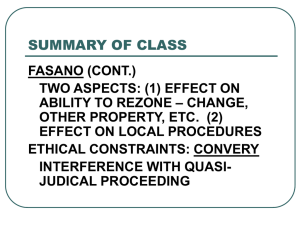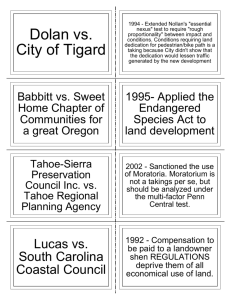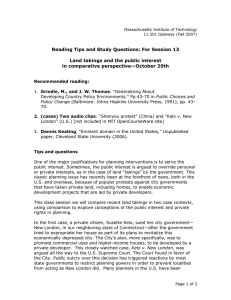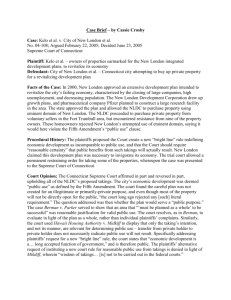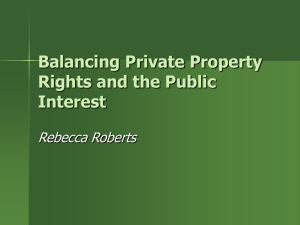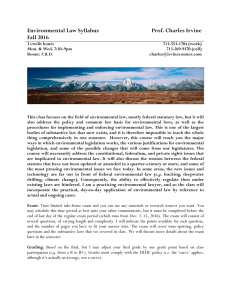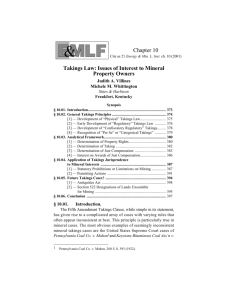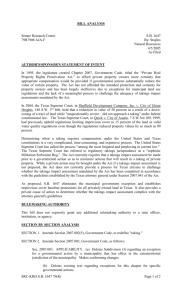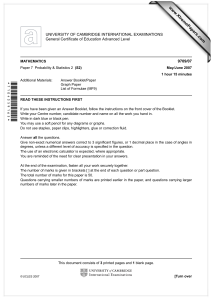Update And Primer On Delaware Eminent Domain And Regulatory Takings Law
advertisement
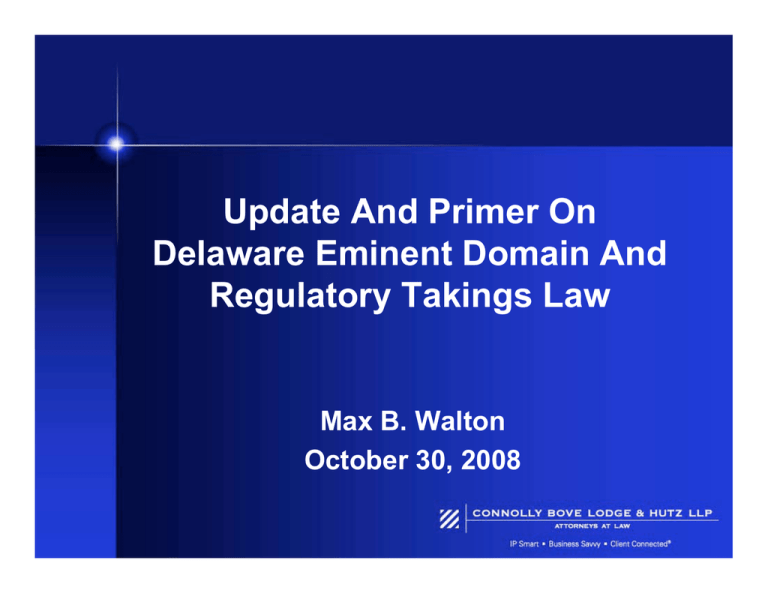
Update And Primer On Delaware Eminent Domain And Regulatory Takings Law Max B. Walton October 30, 2008 Takings Claims Are Constitutional • U.S. Constitution – Fifth Amendment – private property shall not be “taken for public use, without just compensation” • Delaware Constitution, Article I, Section 8 – no person’s property “shall be taken or applied to public use without the consent of his [or her] representatives, and without compensation being made” • Reason: Private individuals should not bear public burdens 2 Two Types Of Takings 1. Physical Takings 2. Regulatory/De Facto Takings A. Temporary takings are a subset of regulatory takings 3 Physical Takings • When the government physically takes possession of land for some public purpose, it has a duty to compensate the owner • If there is a permanent physical invasion, it is a “per se” taking and a duty to compensate arises 4 Physical Taking Examples • State condemnation for roads and rights-of-way • Appropriation of a rooftop to an apartment building for cable TV access • Airspace to approach a government airport 5 Physical Taking Examples, Con’t • Not all physical invasions are takings – government can execute temporary measures without taking – can execute search warrant – can park on private property for one day 6 Several Delaware Agencies Have The Power To Take Land For Specific Public Purposes • DelDOT • DNREC (7 Del. C. § 6613; 7 Del. C. §7009) • Counties and Municipalities • Tax Ditches (7 Del. C. § 4161) • 7 Department of Education (14 Del. C. § 2303) Several Delaware Agencies Have The Power To Take Land For Specific Public Purposes, Con’t • University of Delaware (14 Del. C. § 5114) • Parking Authorities (22 Del. C. § 504) • Office of Management and Budget (29 Del. C. § 405) 8 DelDOT’s Authority To Take 9 • Necessary power to take for public improvements • DelDOT is afforded “broad deference” in deciding how much property is required for a public improvement • DelDOT may take lands for wetlands mitigation • DelDOT even has the power to take private land for improvements to benefit proposed development – 17 Del. C. § 507 Slum Clearance 10 • Municipalities and government agencies have the power to take land for slum clearance in blighted areas – Title 31, Chapter 45 • Delaware courts have held the ability for slum clearance is constitutional • Municipalities that take land for slum clearance must follow specific procedures and make specific findings before the land can be taken Limitations On The Takings Power 11 • Delaware common law is more conservative than other states with respect to condemnation power • Delaware has held that the public use limitation for takings means the agency must take for a public purpose • In the Libby’s case, the Court held that the Wilmington Parking Authority could not condemn Libby’s restaurant so that parking could be reserved for The News Journal – Wilmington Parking Authority v. Wilmington Land With Improvements, 521 A.2d 227 (Del. 1987) Kelo v. City Of New London 12 • Most celebrated takings case ever • Held that State government could take private land even if the economic redevelopment plan had a limited public purpose • Public use requirement of the Fifth Amendment considered broadly – States can limit use of eminent domain • Sparked national debate about the takings issue • Over 40 states have adopted some legislation in response to Kelo, including Delaware Limits On The Takings Power - 29 Del C. § 9505 (15) 13 • In 2005, the General Assembly passed two statutes that limit the ability of the government to take property, even for a public purpose • In 29 Del C. § 9503 (15), the General Assembly required that acquisition of real property through the exercise of eminent domain by any agency shall be undertaken, and the property used, only for the purposes of a recognized public use as described at least six months in advance of the institution of condemnation proceedings: a. In a certified planning document; b. At a public hearing held specifically to address the acquisition; or c. In a published report of the acquiring agency Other Limits On The Takings Power - 29 Del C. § 9503 • 14 The second bill amends 29 Del. C. § 9503, and provides that: – Where a condemnation proceeding is instituted by the agency to acquire real property for such use and the final judgment is that the real property cannot be acquired by condemnation or the proceeding is abandoned, the owner of any right, title or interest in such real property shall be paid such sum as will, in the opinion of the court, reimburse such owner for reasonable attorney, appraisal and engineering fees, actually incurred because of the condemnation proceedings. The awards of such sums will be paid by the agency. Delaware Updates On Eminent Domain Issues • Osborne v. City of Wilmington – Case challenges designation of lands under slum clearance/blighted area statutes – City may seek to take property under an urban renewal project – Property owners are challenging the City’s designation of the lands and the potential urban renewal plan implementation – Court denied the City’s motion to dismiss the case, and the case is currently in litigation 15 Delaware Takings Legislation In 2008 16 • Senate Bill 245 was passed by the General Assembly last year • Would have severely restricted the ability of the government to take land except for very specific public purposes • Bill vetoed and the bill did not receive enough votes for an override at the end of the legislative session • Expect that we will see a new or a compromise bill next session Regulatory Takings/De Facto Takings • When regulation without physical entry causes a compensable taking • Occurs when government directly and substantially interferes with a property owner’s rights • There is no “per se” test to establish what constitutes a regulatory taking • When a regulation “goes too far” it constitutes a regulatory taking - ad hoc inquiry into the facts • Regulation that does not deny all economically viable use of the land generally passes the takings test 17 Salem Church/Penn Central Test For Regulatory Takings • Test: – Reasonable investment backed expectations vs. – Character of the governmental action vs. – The economic impact of the regulation on the claimant • Ultimately the Court weighs and balances the private and public interests 18 What Is Not A Taking • Diminution in property value • A moratorium of a reasonable duration • Ordinance preventing excavation below the water table that stops an existing use • Mere flux in value during governmental decision making processes is an incident of ownership and is not considered a taking 19 What Is Not A Taking, Con’t • Bans on uses of portions of an owner’s property • Downzoning • One to five units permitted on a five acre tract • Rezoning from industrial to agricultural • Development density limits for lack of municipal services 20 What Is A Regulatory Taking? • Requiring a public easement across land as a condition for a permit • Destruction of rights reserved for coal • Requiring exactions that do not have a rough proportionality or nexus with the application • Repeated denials following governmental recommendation 21 How Regulatory Takings Claims Are Heard • Party asserting a takings claim is generally required to exhaust all local administrative remedies first • Usually must exercise State court remedy before asserting a federal cause of action • Until these procedures are followed, no regulatory taking can be established 22 Temporary Takings • When the government denies the owner all economically viable use of the land for a significant period • Unconditional and permanent regulation • Once a taking has occurred, no subsequent action of the government can relieve it of the duty to compensate 23 Temporary Takings, Con’t 24 • A temporary prohibition on economic use (such as a moratorium) does not render a property valueless because the property will recover its value once the prohibition is lifted • Nor does a delay in obtaining permits • Delay does not give rise to takings liability unless the delay is extraordinary Damages For Takings 25 • Takings are calculated based upon what the owner has lost, not what the taker has gained • Also, if shown to be a deprivation of a clearly established constitutional right, can subject individuals to liability under Section 1983 and can obtain attorneys’ fees • Several immunities apply – legislative, governmental, absolute, qualified, petitioning, etc.
